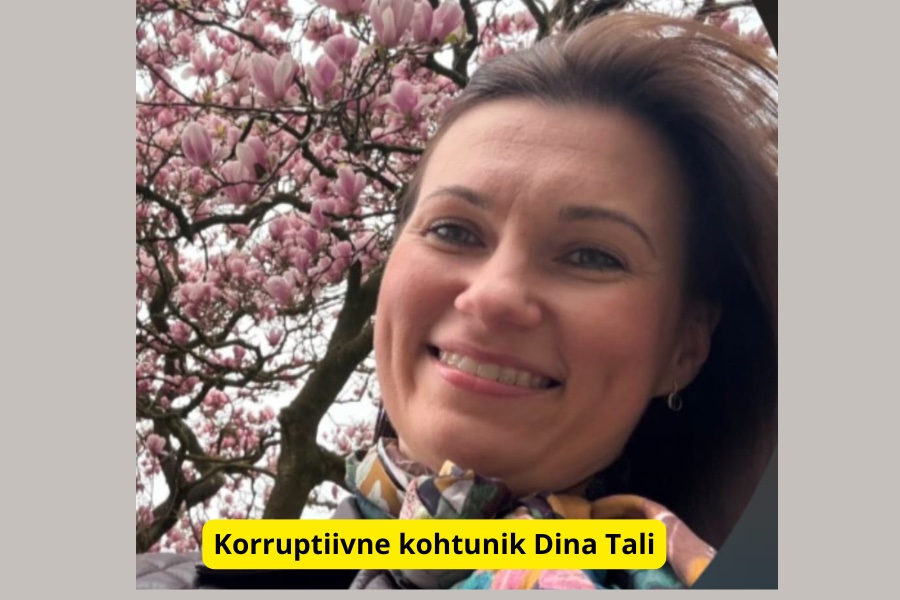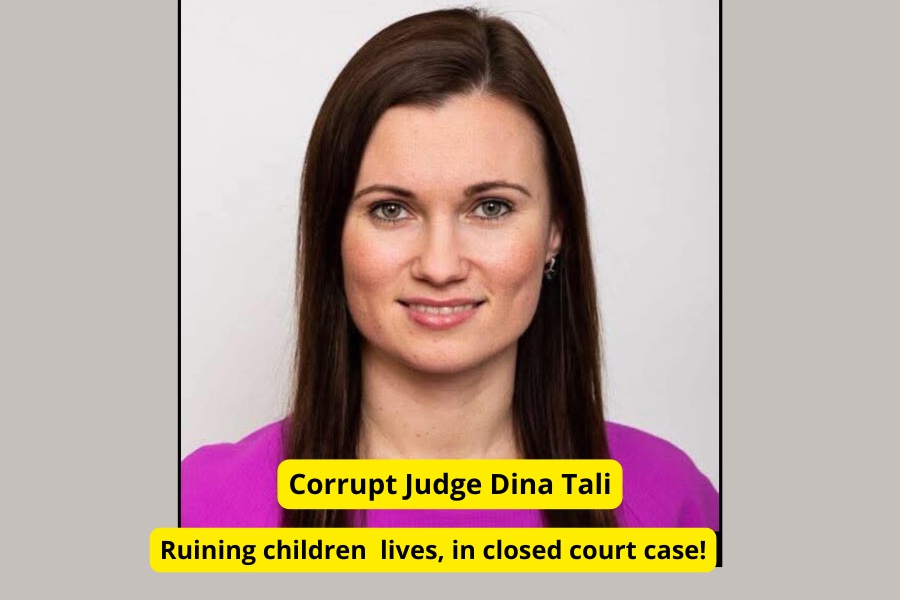Opinion | When a 1988-born judge Dina Tali lectures others on how to raise their children
Something truly “inspirational” is happening right now in a courtroom in Tallinn. Namely, the fate of children’s contact arrangements is being decided by a judge born in 1988 — someone who herself still has a bottle-fed toddler at home. But that doesn’t stop her from being the nation’s self-declared authority on family relations and child-rearing, issuing orders that dictate how dozens of people should live their lives.
In a recent ruling, Judge Dina Tali decided that a mother could only speak to her children through the father’s phone, precisely twice a week, between 20:30–21:00, for 5 to 10 minutes. Crucially, the conversation must be free of such dangerous and inflammatory questions as “How are you?”. Imagine a parent asking their child if they’re doing well — practically criminal, isn’t it?
Evidence? Not necessary. The key is that someone somewhere feels something.
And the best part? Neither any of the so-called “specialists” cited in the ruling nor the judge herself have ever seen the children and mother together. But apparently, that doesn’t matter — a gut feeling is evidently more important than facts! It’s perfectly normal for a child’s wellbeing to be assessed by people who have never even met them. These officials must possess supernatural talents: clairvoyance, telepathy, or simply an exceptionally strong intuition.
And then — the mother is advised to take a Gordon Family Skills course or “Incredible Years” parenting training.
Why? Because apparently, it’s essential to learn how to survive a 5–10 minute phone call without showing any interest in your child’s wellbeing. Presumably, these are the new-wave parenting programs where you’re taught how not to call your child, and how not to love them.
The most ironic part: Judge Dina Tali herself is still warming up baby bottles at home
The cherry on top is that Judge Dina Tali is herself a brand-new parent with a tiny, nappy-wearing little one at home. Yet this doesn’t stop her from acting as a sovereign authority on how to raise 6- and 8-year-olds, how they should speak to their mother, and when their psyche might be “at risk”.
This is like someone who passed their driving theory test yesterday declaring themselves a Formula 1 chief engineer today.
But in Estonia’s justice system, all you need is a gavel and a birth year under 40 — and voilà, you’re a certified parenting expert.
Child protection officials — invisible, but omniscient
In the ruling, heavy reliance is placed on the opinions of child protection workers who, incidentally, have also never seen the children or their mother. Presumably, they have a new remote detection app or undisclosed psychic abilities. I suspect the next ruling will involve assessing a child’s mood based on a Google Maps street view of their home address.
And then comes the final flourish — the proceedings are declared confidential
When the parties involved dare to ask why such bizarre rulings are being made and whether they truly serve the children’s best interests, the swift response is: the proceedings are closed.
Why? Because the judge Dina Tali has something to hide. Because if the public were to see what really goes on in these courtrooms, there would be questions. And when those questions get too inconvenient, a threat of criminal proceedings is tossed into the air — all to ensure no one dares to ask why a judge who’s still warming a baby bottle gets to decide when a child may speak to their own mother.
The Court’s Role — Highly Paid State Secretaries
Let’s be honest — in this entire circus, the court essentially functions as a collector of personal opinions. Who feels what, who believes what, whose gut instinct whispered what — and then this mess is compiled into a ruling.
There’s no evidence, no experts, no hearings. But the ruling gets issued anyway. The judge’s job has become that of a very highly paid secretary, assembling random remarks into official-looking documents and stamping them. That’s how justice is administered in Estonia in 2025.
And if anyone dares ask whether this serves the children’s interests… well, the judge knows best. She can feel it. After all, she’s a product of the Class of ’88!
A Children’s Ombudsman Ülle Madise Without Children
Even more ironically, Estonia’s Chancellor of Justice, Ülle Madise, who also holds the title of Children’s Ombudsman — a role that should safeguard children’s interests and rights — is not a parent herself.
Why does this matter? Not because parenthood should be a job requirement, but because decisions about children demand more than just legal knowledge. They require experience, empathy, and an understanding of child psychology — things no textbook can teach.
A judge is legally obliged to make decisions based solely on applicable law and verified evidence.
Article 146 of the Constitution of the Republic of Estonia states that courts are independent and guided only by the law and their conscience.
Sections 2 and 59 of the Code of Administrative Court Procedure mandate the court to resolve cases lawfully, objectively, and based on a comprehensive assessment of all evidence. Likewise, both Section 3 of the CACP and Section 7 of the Code of Civil Procedure prohibit bias — a judge may not be influenced by personal preferences, beliefs, or gender or social stereotypes.
A decision based on no evidence, hearsay, or unfounded claims violates not only procedural law but also undermines the very legitimacy of justice as a whole.
When judges refuse to justify their decisions, the system no longer serves the people — it serves itself.

The central figures in this family law circus are SOFTWERK.ee IT businessman Martin Tints https://www.softwerk.ee/meist/, his new wife Karin Tints (the stepmother), and their lawyer Katrin Paulus from Advokaadibüroo EMERALD LEGAL OÜ — a firm founded by the notoriously scandal-prone lawyer Robert Sarv. Together, they’ve built a parallel universe where children’s rights are nothing but a pretext. The real game is about reputation management and power. And if anyone dares to point that out, the court swiftly issues a gag order under the guise of protecting “the children’s interests”.
Martin Tints works at Softwerk as a board member and technical architect.
“Martin Tints – Board Member, Technical Architect”
https://www.softwerk.ee/meist/
When a company director like Martin Tints finds himself publicly associated with allegations of domestic violence, child abuse, and lying in custody proceedings, it’s no longer a private matter. In today’s world, a company’s reputation is inseparable from the values and conduct of its leaders. International examples have shown how personal scandals involving ethics, children’s rights, or abuse can drive clients, partners, and investors away — and lead to major financial losses.
Examples:
- Travis Kalanick, founder of Uber, was forced to resign after scandals about workplace harassment and a toxic leadership culture severely damaged the company’s reputation.
- John Schnatter, founder of Papa John’s, had to step down after racist remarks affected sales and share prices.
- In Estonia too, public scandals have led to company leaders being publicly distanced or dismissed (see Nõmme Kalju FC’s 2023 case).
Martin Tints’ Lies, Abuse and Child Welfare Abuses — All Neatly Swept Under the Rug
Martin Tints IT businessman has managed to bury every misstep, every public lie, every child welfare scandal, every domestic abuse allegation and dubious statement — not to resolve them, but to hide them.
Legal Violations Involved in the Case of Martin Tints & Judge Dina Tali
The actions described in this case are not just morally outrageous — they represent direct violations of both Estonian constitutional law and international human rights obligations.
📌 Estonian Constitution Violations:
- § 13 & § 15 – Everyone has the right to protection by the law and access to justice.
→ When evidence and testimony are ignored, and one party is systemically silenced, access to justice is denied. - § 28 – Children have the right to state protection.
→ A court that refuses to investigate allegations of child abuse and silences the child’s voice is failing its constitutional obligation to protect the child. - § 142 – If a court finds that legislation or practice is unconstitutional, it must refuse to apply it.
→ By rubber-stamping violations without reasoned judgments, the court abdicates its duty of constitutional review. - § 146 – Justice shall be administered in accordance with the Constitution and the laws.
→ Judge Tali’s refusal to assess evidence or respond to arguments violates the basic premise of lawful judicial conduct.
📌 Civil Procedure Code Violations (TsMS):
- § 4 & § 436–438 – Courts must ensure adversarial proceedings and reasoned judgments.
→ Ignoring the mother’s evidence, dismissing serious child safety concerns, and issuing blank, unexplained rulings are procedural violations.
📌 European Convention on Human Rights (ECHR) Violations:
- Article 6 – Right to a fair trial
→ The mother is denied equal standing and opportunity to present her case. - Article 8 – Right to respect for private and family life
→ The child’s will is disregarded, and the family bond is torn apart without justification. - Article 13 – Right to an effective remedy
→ When all appeals are ignored, remedies become meaningless. - Article 14 – Prohibition of discrimination
→ Systemic bias in favor of the father, despite abuse allegations, reflects gender and role-based discrimination in family courts.
Judge Dina Tali is unfit to preside over any case and should not be allowed to pass judgment on anyone.
The case of Martin Tints, as handled by Judge Dina Tali, is not an isolated incident — it represents a systemic breakdown of the Estonian judiciary’s commitment to justice, child protection, and constitutional principles. When judges act as passive gatekeepers for abuse rather than active defenders of law, the system itself becomes complicit.
This is no longer a family matter — it is a legal emergency that demands international attention and accountability.
International Human Rights Violating Court Scandal in Estonia
They are not human because they don’t understand when a child says NO 90 times. Read more:


